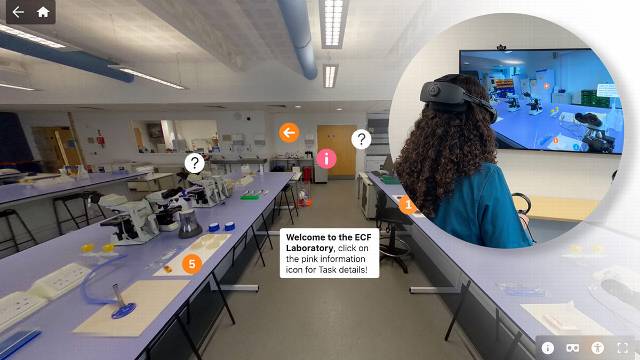
Second year undergraduate veterinary nursing students spent a winter’s morning working hard to further their practical skills to aid them whilst on placement and for their final year ‘OSCE’ examinations. The aim of the session was to collect urinary samples from otherwise healthy dogs out on their normal toilet breaks to practise specific gravity testing, using dip sticks and sediment examination.
Members of the veterinary nursing teaching team, Linzi Nuttall and Helen O’Neill, led the session, going through each step of the practical with the students, so that they could experience the challenges of urine collection themselves. While the students did eventually gain a sample from the dogs, it did take some time. Helen said, “This is the challenge of working with animals; sometimes you don’t get the desired results, but hopefully we will be able to see some clear conclusions in the laboratory.”
Inside the laboratory, students used refractometers to test urinary specific gravity, which measures the density of urine against an equal measure of distilled water, indicating the concentration of the sample. To back up these findings, the students used dip sticks to read additional chemical parameters. Alongside this, the students examined urine sediment under a microscope, giving them the ability to identify different cell types which may help to inform a diagnosis. Suspended sediment may contain crystals as pictured below; by delicately maneuvering the microscope slides, we were able to capture exactly what the students were viewing. Samples degrade over time, sometimes meaning that the presence of urinary crystals are of no clinical significance. This highlighted to the students the need to test urine samples as soon as possible to prevent false positive crystal identification.
Holly Kendall, a second year BSc (Hons) Veterinary Nursing with Companion Animal Behaviour student, spoke about the use of this session saying, “Working on this practical aspect of learning is really useful to understand lectures in context. Being able to go through the motions of the procedure helps consolidate everything we are taught.”
Sarah Warren, fellow classmate, agreed commenting, “Being prepared for future ‘OSCE’ exams can only be a good thing. Overall, it’s been a really positive experience.” The foundational learning undertaken at this stage of the degree implements skills that will be carried through university and out into the workplace.
The session was productive and useful for all the students involved highlighting the heavy scientific basis that the veterinary nursing course encompasses. Should you be interested in the undergraduate veterinary courses, you can view them here.
 Blog: Veterinary Medicine students step into immersive 360° laboratory
At Harper & Keele Veterinary School, students are stepping beyond the traditional microbiology bench and into an immersive 360° labo …
Posted
Yesterday
Blog: Veterinary Medicine students step into immersive 360° laboratory
At Harper & Keele Veterinary School, students are stepping beyond the traditional microbiology bench and into an immersive 360° labo …
Posted
Yesterday











